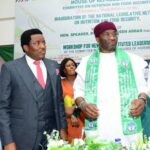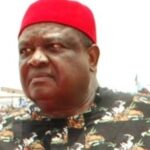Public policy experts, Nextier, has propounded strategies that can prevent the current political crisis in Rivers State from have more dire implications on the people or even escalating in the country and damaging state institutions.
In a report concerning the situation that has pitched the immediate past Governor of the State, Nyesom Wike, and the current Governor, Sim Fubara, against each other, Nextier highlighted the unintended consequences and how to stem the conflict from consuming the nation.
The report was authored by Dr. Chibuike Njoku, an Associate Consultant at Nextier, Senior Research Fellow at the Institute of Advance Studies, Ile-Ife, and Senior Research Fellow at the Institute Francais De Recherche en Afrique (IFRA-Nigeria); and Dr. Ndu Nwokolo, a Managing Partner at Nextier, Honorary Fellow at the School of Government at the University of Birmingham, and a Visiting Research Fellow at the Nathanson Centre on Transnational Human Rights, Crime, and Security at York University Canada.
They noted that the power struggle between Wike and Fubara has led to administrative instability, affecting the implementation of policies and developmental projects just as public services and infrastructure development have also suffered as resources are diverted to support political agendas.
“The crisis mirrors broader issues in Nigerian politics, where power struggles often lead to institutional decay and governance failures. Also, the manipulation of state institutions, including the legislature and security forces, has raised questions about the integrity and impartiality of these bodies. The politicisation of these institutions undermines public trust and their primary functions.
“On the other hand, political instability has potential economic repercussions, deterring investment and slowing economic development. The uncertainty surrounding the state’s political future creates an unfavourable environment for business and growth. The conflict has contributed to social tensions, with communities and political factions divided in loyalties. The public’s faith in the political process is eroded when leaders prioritise personal power over collective welfare”, they stated.
To resolve this and stem the tide, the Nextier scholars recommended that Rivers State should: “Ensure the judiciary is insulated from political influence by implementing measures to ensure the judiciary’s independence, including establishing clear guidelines for the appointment and secure tenure for judges and mechanisms to prevent political interference in judicial processes.
“Strengthen the independence of the Independent National Electoral Commission (INEC) by securing its funding through a statutory allocation. Implement transparent processes for appointing commissioners and enhance oversight mechanisms to ensure impartiality.
“Encourage political parties to adopt internal democratic practices when selecting candidates. This includes conducting free and fair primary elections and promoting intra-party dialogue and conflict resolution mechanisms.
“Establish legal frameworks that mandate political parties publicly disclose their succession plans and processes. This transparency will reduce the manipulation of succession for personal gain.
“Strengthen anti-corruption agencies by providing adequate resources and autonomy. Implement robust mechanisms for tracking and auditing government expenditures and prosecuting corrupt officials.
“Encourage active participation of civil society organisations in monitoring government activities. Facilitate platforms for citizens to report corruption and maladministration.”
Nextier concluded that “the political class conflict in Rivers State, epitomised by the conflict between Nyesom Wike and Siminalayi Fubara, underscores the deep-seated issues within Nigerian politics. The manipulation of the law, police, and judiciary by these actors reveals a broader pattern of institutional exploitation for political supremacy.
“The ongoing power tussle has destabilised Rivers State and highlights the fragility of democratic governance in Nigeria. Addressing these challenges requires a concerted effort to strengthen state institutions, promote transparency, and ensure that political actors are held accountable for their actions.”




